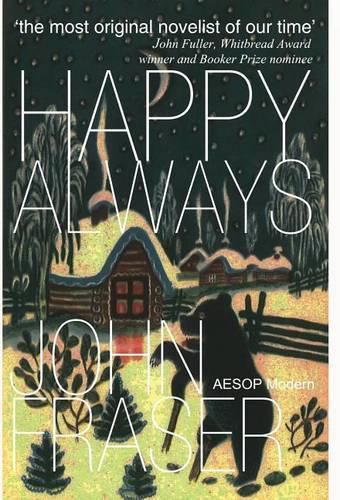Readings Newsletter
Become a Readings Member to make your shopping experience even easier.
Sign in or sign up for free!
You’re not far away from qualifying for FREE standard shipping within Australia
You’ve qualified for FREE standard shipping within Australia
The cart is loading…






This title is printed to order. This book may have been self-published. If so, we cannot guarantee the quality of the content. In the main most books will have gone through the editing process however some may not. We therefore suggest that you be aware of this before ordering this book. If in doubt check either the author or publisher’s details as we are unable to accept any returns unless they are faulty. Please contact us if you have any questions.
John Fraser’s latest work of speculative fiction, Happy Always concerns two journeys. In Here and Back Again, the young narrator escapes from his isolated village, lives poor in Paris, is involved in marginal schemes which bring him close to a police unit. The unit is disgraced - through his fault - and he turns to new friends - one, a musician, promotes avant garde mass concerts in Africa, another sends him to a remote part of Russia. Here, he is to supervise an imported jungle installation. He tries, and fails, in an attempt to trek back to humanity’s origins in Africa, returns to Paris, working in a team of rickety mountebanks in the Metro.
In Happy, a young drifter serves as chauffeur to a wealthy boss, who is killed in a botched robbery, leaving the narrator independent - teaching English and living by expedients among market traders. The latter go their separate, fatal ways. After some vicissitudes, he follows the pursuit of happiness, his outstanding quality, and takes a voyage on a pleasure boat. Its lady captain becomes his lover, but passes on to him a fatal illness. He remains happy.
The questions raised give substance to these extravagant tales. The epigraph asks: what is human culture? Does it change through time, or is it always rooted in our species, the animal within? Do individuals begin in personal circumstance, or are they bound to a quest for species consciousness? Does culture lead, or follow, and does humanity possess a set of rules, or laws? How do we recognise our animality, in relation to other animals, and how do we treat and see them? When we die - what do we leave behind? In the end the quest seems circular.
$9.00 standard shipping within Australia
FREE standard shipping within Australia for orders over $100.00
Express & International shipping calculated at checkout
This title is printed to order. This book may have been self-published. If so, we cannot guarantee the quality of the content. In the main most books will have gone through the editing process however some may not. We therefore suggest that you be aware of this before ordering this book. If in doubt check either the author or publisher’s details as we are unable to accept any returns unless they are faulty. Please contact us if you have any questions.
John Fraser’s latest work of speculative fiction, Happy Always concerns two journeys. In Here and Back Again, the young narrator escapes from his isolated village, lives poor in Paris, is involved in marginal schemes which bring him close to a police unit. The unit is disgraced - through his fault - and he turns to new friends - one, a musician, promotes avant garde mass concerts in Africa, another sends him to a remote part of Russia. Here, he is to supervise an imported jungle installation. He tries, and fails, in an attempt to trek back to humanity’s origins in Africa, returns to Paris, working in a team of rickety mountebanks in the Metro.
In Happy, a young drifter serves as chauffeur to a wealthy boss, who is killed in a botched robbery, leaving the narrator independent - teaching English and living by expedients among market traders. The latter go their separate, fatal ways. After some vicissitudes, he follows the pursuit of happiness, his outstanding quality, and takes a voyage on a pleasure boat. Its lady captain becomes his lover, but passes on to him a fatal illness. He remains happy.
The questions raised give substance to these extravagant tales. The epigraph asks: what is human culture? Does it change through time, or is it always rooted in our species, the animal within? Do individuals begin in personal circumstance, or are they bound to a quest for species consciousness? Does culture lead, or follow, and does humanity possess a set of rules, or laws? How do we recognise our animality, in relation to other animals, and how do we treat and see them? When we die - what do we leave behind? In the end the quest seems circular.